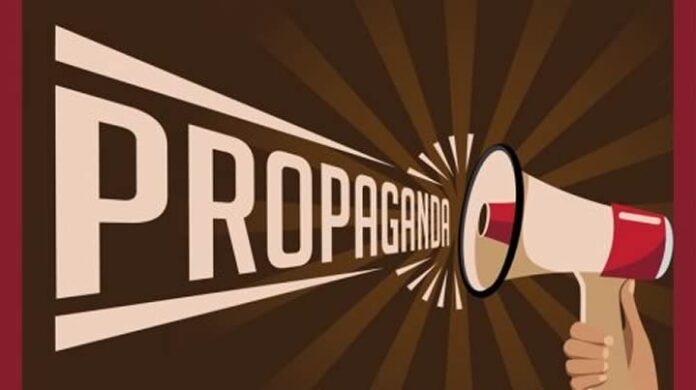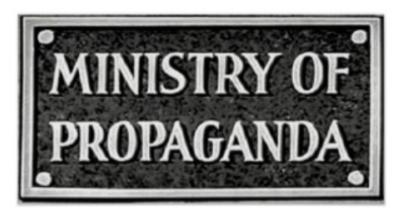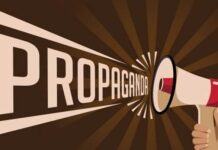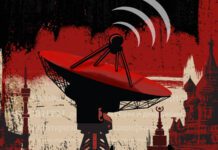“The West imposes homosexuality and paedophilia on us”;
“Membership in the European Union (EU) means acceptance of same-sex marriage”;
“European values contradict traditional morality”.
These messages have been aggressively disseminated by Kremlin propaganda in recent years, especially since 2013. And this is no accident – they are part of a long and consistent Kremlin propaganda strategy to export “homophobic nationalism”, as the journalist J Lester Feder from BuzzFeed News aptly defines it.
It was the Ukrainian Maidan in 2013 that was the first overseas test of this strategy, previously applied against protesters in Russia and political opponents of Vladimir Putin in 2011 and 2012.
According to Stockholm University associate professor Emil Edenborg, Moscow is using homophobia as a geopolitical weapon, and in official Russian rhetoric presents the war in Ukraine as a natural extension of this policy by other means.
Edenborg describes homophobia as part of Russia’s “ideology of ‘traditional values’, which portrays the rights of the LGBTQ+ community as an existential threat to the nation.”
In his analysis for the Boston Review, he recalls how in 2012 the concept of “traditional values” became the official ideology of the domestic and foreign policy of Vladimir Putin’s government, which has been pushed to the wall by mass protests and falling approval ratings.
The protection of ‘traditional values’ as state policy
The concept of “traditional values” was officially established as the policy of the Russian Federation by a decree of President Vladimir Putin in November 2022. In December of the same year, amendments to the federal information law banned LGBTQ+ propaganda. And in April 2023, Roskomnadzor published the criteria by which it will block “propaganda on the Internet of non-traditional sexual relations, paedophilia and gender reassignment”.
Particular emphasis is placed on patriotism, service to the Fatherland, high moral ideals, a healthy family, Orthodoxy. In the rhetoric of the Kremlin and the media loyal to the authorities, the rights of the LGBTQ+ community, feminism and multiculturalism are often defined not only as foreign to “Russian values”, but also as an existential threat to the nation.
In the federal national security strategy, published in July 2021, there are at least 20 references to “traditional values” within 43 pages. The document states: “Special attention is paid to the support of the family, motherhood, fatherhood and childhood (…); raising children and their overall spiritual, moral, intellectual and physical development (…); higher birth rates are necessary for the Russian population to grow”.
In 2020, a ban on same-sex marriage was added to the Russian constitution. In late 2021, a number of LGBTQ+ organizations were added to the federal “foreign agent” list. However, LGBTQ+ organisations are not alone. Journalists and researchers critical of the authorities, opposition politicians and human rights activists have also been harassed, silenced, arrested and even killed by the increasingly authoritarian regime in Moscow.
According to Amnesty International’s 2022 report, representatives of the LGBTQ+ community in Russia are subject to increasing discrimination and stigmatization. The problems worsened even more after the start of the war in Ukraine. The Kremlin uses homophobia as a dividing line between “righteous” Russia and the “morally rotten” Western world and thus uses it as one of the arguments for its illegal aggression against Ukraine.
The myth of ‘innocent’ Russia and the ‘wrong’ West
Historian Timothy Snyder provides an in-depth analysis of Putin’s propaganda. He found its ideological roots nearly a hundred years back in time – in the work of Ivan Ilyin, defined by Snyder as a “fascist philosopher”, who was rehabilitated by Vladimir Putin.
Ilyin developed the idea of God’s chosen, innocent and righteous Russia, a victim of the decadent, depraved and sinful West. He emphasises homosexuality in the image of the morally rotten West – a motif actively used in modern Kremlin propaganda. “(…) they (the Western world – ed.) tried to destroy our traditional values and impose their false values on us to destroy us (…),” Putin said in February 2022.
The myth of Russia’s “divine” mission to preserve Christian civilization after the Western world’s turn to materialism, secularism, and individualism can be traced even before Ilyin.
As early as the 16th century, the concept of Russia as the successor of the Roman and Byzantine Empires and the last refuge of Orthodoxy (“Moscow as the Third Rome“) appeared, which also lay in the doctrine of Pan-Slavism. The idea is present in the works of popular Russian novelists such as Fyodor Dostoyevsky, and Russian philosopher Nikolai Berdyaev “transformed the idea into a remarkable synthesis of Marxism and Russian Orthodoxy with a pronounced anti-Western character.”
Seen through this prism, everything coming from the West – including liberal democracy – is equated with homosexuality and interpreted as decadent and degrading. The Russian president likes to pose for journalists riding a horse, hunting in the forest or playing sports, sometimes even naked to the waist. In the words of Snyder, “Putin raises masculinity as an argument against democracy.”
‘Gayrope’, degradation and Satanism
In the Kremlin’s narrative, the “homosexual propaganda” of the West leads not only to the corruption of traditional societies, but also has very specific and pragmatic goals – to reduce their population and thus weaken and eliminate them.
In an article from 2012, businessman Vladimir Yakunin – close to the Russian president and a follower of the ideas of Ilyin – wrote that it is immoral for a “mistake of nature” to become the norm and allow the development of “social homosexuality”. According to him, the propaganda of homosexual relations is a strategy of developed Western countries to reduce the population of the rest of the world and turn humanity into an obedient herd managed by the global financial elite.
In September 2013, during the Valdai Discussion Club (the Russian alternative to the World Economic Forum in Davos), Putin emphasised that there is a demographic problem in all European countries and in Russia, and “same-sex marriages do not produce children”, which corresponds to the concerns expressed in Russia’s national security strategy.
Almost 10 years later, the conspiracy to reduce the world’s population by “corrupting” children continues to be present in the Kremlin’s rhetoric.
“Western society has put children between the millstones, promoting gender reassignment, legalising paedophilia, trafficking of minors, child pornography. Proponents of genocide will not stop at castration and justifying child abuse. They need more human sacrifices,” reads a December 2022 Strategic Culture Fund text.
In the context of the Ukrainians’ stated desire for rapprochement with the EU, the Kremlin spares no effort to present European integration as “legalizing same-sex relationships and thus spreading homosexuality,” Snyder says.
In 2013, the largest Russian newspaper, Komsomolskaya Pravda, came out with the claim that the Maidan protests in Kyiv were organised by “nationalists, antisemites, neo-Nazis and homosexuals.”
And according to the Russian Patriarch Kirill, the refusal of Donbas to accept the “values” of the West, including the “test of loyalty” to the Western world – the “gay parade”, is the reason for the crisis in Eastern Ukraine, which began in 2014. According to Patriarch Kirill, it is about for something more than political interests and processes, but for the “salvation of man”.
One of the most emblematic words in this type of propaganda is “Gayrope” – a combination of “gay” and “Europe”.
In autumn 2013, Kyiv was littered with posters that read, “Associating with the EU means same-sex marriage,” reports J. Lester Fedor for BuzzFeed News.
Behind the campaign is an organisation called “Ukrainian Choice”, financed by Viktor Medvedchuk – businessman, media owner and former MP. He is considered close to Vladimir Putin and even boasts that the Russian president is the godfather of his youngest daughter.
In May 2021, Medvedchuk was charged with treason and financing terrorism. After the beginning of the Russian invasion of Ukraine, he escaped from house arrest, but a little later the Ukrainian authorities announced that he had been detained again.
In 2013, Medvedchuk’s men staged anti-European protests in Kyiv, chanting “European values are gays, lesbians and the corruption of minors”. His associate and leader of the “Ukrainian Parents’ Committee” was organising actions against the signing of the agreement with the EU, because it would lead to the legalisation of same-sex marriage, until homosexuality becomes the norm, and anyone who has a different point of view will be punished. “This is called a homodictatorship,” Skvortsov said.
Alexey Pushkov, who in 2013 was the chairman of the foreign policy committee in the Russian Duma, wrote on Twitter: “After the release of Tymoshenko (Yulia Tymoshenko – note ed.) the EU will ask Ukraine to expand gay culture. And instead of Victory parades, gay parades will be held in Kyiv.”
Homophobic propaganda is often defined as a manifestation of the “satanic” nature of the West.
Back in in 2010, the mayor of Moscow Yury Luzhkov banned the holding of a gay parade in the Russian capital, calling it a “satanic act” and defining homosexuality as a “social plague”.
In a speech to the Valdai Discussion Club in September 2013, Vladimir Putin compared same-sex partnerships to Satanism. According to Putin, an attempt is being made “to export this model all over the world”.
“I am convinced that this opens a direct path to degradation and primitivism, which lead to a deep demographic and moral crisis,” says the Russian president.
When, in 2022, Putin announced the illegal annexation of four eastern Ukrainian regions, he once again spoke of Russia’s struggle against the West and the LGBTQ+ community, which he collectively defined as “pure Satanism.”
According to Kremlin propaganda, there is a link between homosexuality and fascism, and Ukraine is proof of that. In 2014, the Strategic Culture Fund published an article entitled “Fascism, homosexuality and aggression as elements of the Ukrainian political reality”.
“The connection between fascism, aggression and homosexuality has long been noticed, and not only by psychiatrists,” the article says.
In 2013, Russian TV presenter and propagandist Vladimir Solovyov tweeted a quote from a 1934 article by Maxim Gorky, in which the writer used a popular Russian phrase at the time: “Exterminate the homosexuals – fascism will disappear.”
Today’s Russian social media users often use the expression “gay-Nazism” when discussing the political situation in Ukraine and in Western countries.
Words like “Gayrope”, “Eurogay”, “liberast”, “tolerast” (the last two referring to the Bulgarian word for faggot combined with liberal and tolerance), etc. are recognisable in the anti-democratic and anti-European rhetoric in Bulgaria. This propaganda vocabulary began to penetrate the Bulgarian media as early as 2013, but reached the peak of its popularity in 2018 in the debates on the adoption of the Istanbul Convention.
Then the word “gender” was created and imposed – a negative name for people with non-traditional sexual orientation, as well as for those who sympathise with them, and in a broader sense – for human rights defenders, civil society and supporters of liberal values in general.
By exporting “homophobic nationalism”, Russia is carrying out a much more comprehensive plan – to undermine the foundations of European liberal democracies based on the principles of respect for human rights and tolerance. Because of this, European values are presented as focused solely on the rights of sexual minorities, and the EU is accused of carrying out “gender propaganda”.
On this basis is built the suggestion that the EU is morally unacceptable and destroys traditional values. And in the context of Russia’s war against Ukraine, the messages of a value gap with the EU and traditional closeness with Russia are used to achieve very specific political goals.
As a greeting from the Ambassador of the Russian Federation to Bulgaria Eleonora Mitrofanova on the occasion of May 24 – a day celebrated in Bulgaria country as a holiday of Bulgarian education and culture and of Slavic writing, although according to the Russian ambassador it is “a day of Slavic writing and culture”:
“It is known that belief and language environment largely determine a person’s worldview, his ideas of good and evil, right and wrong. That is why it is easy for us to understand each other – after all, if we remove the political situation and the complexity of the current moment, the Russian and Bulgarian peoples continue to speak practically the same language.”
(Photo: Ludovic Bertron)
https://bityl.co/J32k








